春仁爱英语八年级下册语法知识点
英语仁爱版八年级下册知识点总结
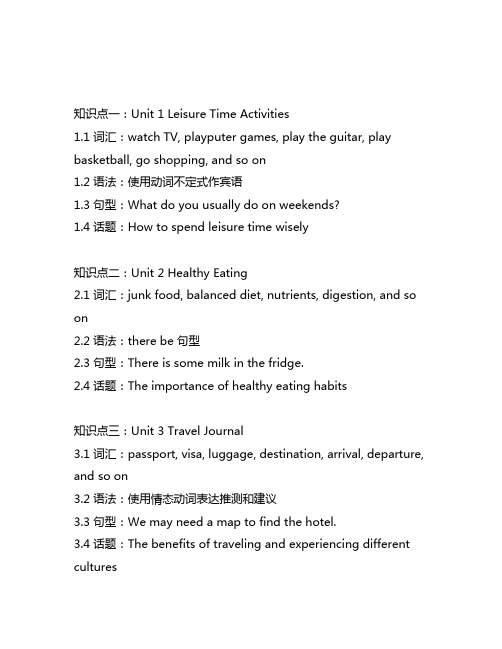
知识点一:Unit 1 Leisure Time Activities1.1 词汇:watch TV, playputer games, play the guitar, play basketball, go shopping, and so on1.2 语法:使用动词不定式作宾语1.3 句型:What do you usually do on weekends?1.4 话题:How to spend leisure time wisely知识点二:Unit 2 Healthy Eating2.1 词汇:junk food, balanced diet, nutrients, digestion, and so on2.2 语法:there be 句型2.3 句型:There is some milk in the fridge.2.4 话题:The importance of healthy eating habits知识点三:Unit 3 Travel Journal3.1 词汇:passport, visa, luggage, destination, arrival, departure, and so on3.2 语法:使用情态动词表达推测和建议3.3 句型:We may need a map to find the hotel.3.4 话题:The benefits of traveling and experiencing different cultures知识点四:Unit 4 Making the News4.1 词汇:reporter, headline, journalist, article, interview, and so on4.2 语法:使用虚拟语气表示假设4.3 句型:If I were you, I would follow the latest news.4.4 话题:The role of media in shaping public opinion——《英语仁爱版八年级下册知识点总结》1. 介绍英语作为一门国际通用语言,对于提高个人综合素质和竞争力具有重要意义。
仁爱版八年级英语下册知识点
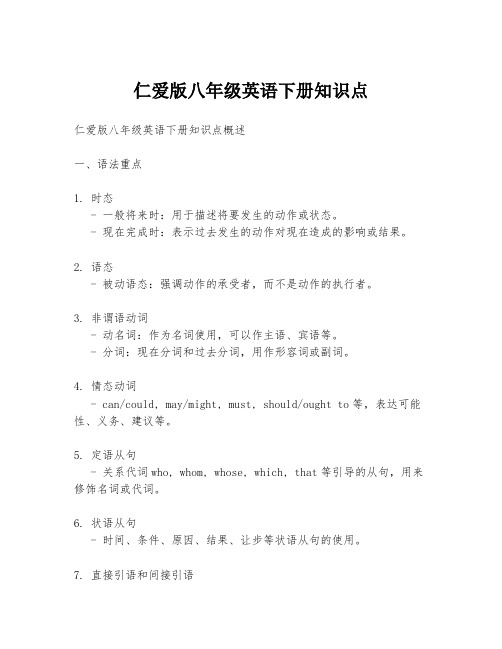
仁爱版八年级英语下册知识点仁爱版八年级英语下册知识点概述一、语法重点1. 时态- 一般将来时:用于描述将要发生的动作或状态。
- 现在完成时:表示过去发生的动作对现在造成的影响或结果。
2. 语态- 被动语态:强调动作的承受者,而不是动作的执行者。
3. 非谓语动词- 动名词:作为名词使用,可以作主语、宾语等。
- 分词:现在分词和过去分词,用作形容词或副词。
4. 情态动词- can/could, may/might, must, should/ought to等,表达可能性、义务、建议等。
5. 定语从句- 关系代词who, whom, whose, which, that等引导的从句,用来修饰名词或代词。
6. 状语从句- 时间、条件、原因、结果、让步等状语从句的使用。
7. 直接引语和间接引语- 引述别人的话,注意时态、人称和指示代词的变化。
二、词汇与短语1. 常用词汇- 描述人物特征的形容词,如kind, honest, creative等。
- 描述日常活动的动词短语,如clean up, take out, give up等。
- 与学校生活相关的名词,如classroom, library, project等。
2. 短语动词- look after, turn off, get along with等。
3. 常见搭配- 形容词与名词的搭配,如good habits, heavy rain等。
- 动词与副词的搭配,如finish quickly, study hard等。
三、阅读理解1. 抓住文章主旨- 通过阅读标题、首段和结尾段,快速把握文章大意。
2. 推理判断- 根据上下文线索,推断生词或隐含信息的含义。
3. 细节理解- 通过关键词定位,准确获取文章中的具体信息。
四、写作技巧1. 句型多样性- 使用复合句、并列句等多样化的句型,丰富文章结构。
2. 逻辑连贯- 使用连接词,如however, therefore, moreover等,使文章结构清晰、逻辑性强。
仁爱英语八年级下册知识点总结
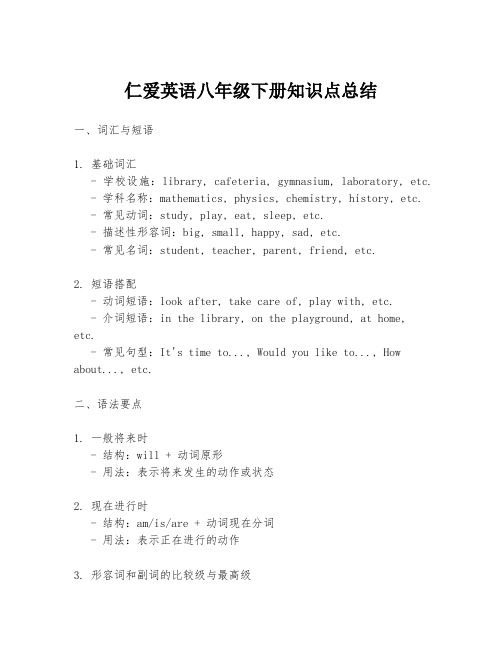
仁爱英语八年级下册知识点总结一、词汇与短语1. 基础词汇- 学校设施:library, cafeteria, gymnasium, laboratory, etc. - 学科名称:mathematics, physics, chemistry, history, etc. - 常见动词:study, play, eat, sleep, etc.- 描述性形容词:big, small, happy, sad, etc.- 常见名词:student, teacher, parent, friend, etc.2. 短语搭配- 动词短语:look after, take care of, play with, etc.- 介词短语:in the library, on the playground, at home, etc.- 常见句型:It's time to..., Would you like to..., How about..., etc.二、语法要点1. 一般将来时- 结构:will + 动词原形- 用法:表示将来发生的动作或状态2. 现在进行时- 结构:am/is/are + 动词现在分词- 用法:表示正在进行的动作3. 形容词和副词的比较级与最高级- 比较级:通常加-er 或使用more,less- 最高级:通常加-est 或使用most4. 可数名词与不可数名词- 可数名词:可以用数字计数的名词- 不可数名词:不能用数字计数的名词5. 代词的使用- 人称代词:I, you, he, she, it, we, they- 物主代词:my, your, his, her, its, our, their- 反身代词:myself, yourself, himself, herself, itself, ourselves, yourselves, themselves三、阅读理解技巧1. 快速阅读(Skimming)- 快速浏览文章,抓住主要信息2. 精读(Scanning)- 仔细阅读文章,理解细节内容3. 推理判断(Inference)- 根据上下文推断词义或作者意图四、写作技巧1. 描述性写作- 描述人物、地点、事件或物品2. 叙事性写作- 讲述一个故事或事件的发生过程3. 议论性写作- 表达观点,提供论据,进行论证五、听力技巧1. 预测(Prediction)- 根据题目或图片预测对话或短文的内容2. 捕捉关键信息(Key Information)- 注意数字、时间、地点等关键信息3. 理解大意(Main Idea)- 抓住对话或短文的中心思想六、口语表达1. 日常交流- 问候、自我介绍、询问信息等2. 描述与叙述- 描述经历、叙述事件等3. 表达观点- 讨论、辩论、表达个人看法等七、文化知识1. 英语国家的节日与习俗- 了解不同国家的节日和相关习俗2. 英语习语和俚语- 学习并运用常见的英语习语和俚语3. 英语国家的历史与地理- 了解英语国家的基本历史和地理知识八、学习策略1. 制定学习计划- 设定学习目标,规划学习时间和内容2. 有效记忆- 运用联想记忆、分组记忆等方法记忆单词和语法点3. 自我检测- 定期进行自我测试,检查学习效果以上是仁爱英语八年级下册的主要知识点总结。
[原创归纳]仁爱版八年级下英语语法归纳
![[原创归纳]仁爱版八年级下英语语法归纳](https://img.taocdn.com/s3/m/8d95b6f58ad63186bceb19e8b8f67c1cfad6eed0.png)
初二年下册英语语法归纳(仁爱版)【2】Unit5Topic1SectionA2.1nvitesb./todosth.邀请或人做某事;Invitesb.\+地点邀请或人去某地.3.Prepare...for...=getreadyfor...为预备.4.Saythankstosb.向或人道谢. SectionBl.Aticketto\for的票.2.Beabletodosth...=can有才能做某事.但是can一般用于如今时和曩昔时而beableto可以用于任何时态・3................................................................................ Ringsb.up打德律风给或人.4.Beproudof以自满.5.Bepleasedwith.对..满足.SectionC1.Careabout关怀;Care+从句省略about2.Getmarriedtosb.=marrysb.与或人娶亲.3.关于消费:Sth.Costsb.+钱;Sb.spend+时\钱in.onsth.'doingsth.Ittakesb\时todosth.;Sb.pay钱forsth.4.Beon上映.5.Cheerup使振作.6.What...for=why.(白话)SectionDeintobeing形成.2.Befullof=befilledwith充满.3.......................... Endwith以结尾.4.Makepeacewithsb.与或人媾和.Unit5Topic2SectionA1.Seem/todosth.似乎做某事.\adj作表语.;Itseemthat+从句.2.Havetalkwithsb.与或人攀谈.3.Bestrictwithsb.对或人严厉.SectionBl.Failtodosth.掉败,做不到某事.2.Atone'sage.在年纪时3.Attheageof.在岁时4.Makesb.todosth让或人做某事.As+adj\adv原级+as与一样;Notas\so+adj\adv原级+as与不一样.6.Be\getusedtodoingsth.习惯做某事;Usedtodosth.曩昔习惯做某事.SectionC 1.Beafraidofdoingsth.畏惧做某事.2.Dealwith=dowith.处理.4.Refusetodosth.谢绝做某事.5.Eventhough=even讦即使.6.Not...anylonger=nolonger不再.7.Fallasleep入睡.8.Inone'steens在或人的时期.9.Give.ahand=dosb.afavor=helpsb.给或人关心.10.比较级+and+比较级越来越程度递增.The+比较级...The+比较级…越越两种情形同时变.11.原因状语从句.Unit5Topic3SectionA1.Have\has+动词曩昔分词.如今完成时.2.Can'tbe确定不是,否认推想.3.Mustbe必定是,确定推想.4.Maybe可能是,猜测推想.5.Attheendof...在…的最后;Intheendof...最后.6・That\it's+adj+foi\tobdosth.7.1nsteadof+n.\v\代…代替8.Taketurnstodosth.=taketurnsatdoingsth.=dobyturns轮流做某事.SectionB 1......................................... B ebad\good for...对有害\益.2661alongwithsb\sth与相处得好.3.Justas似乎.4.Smileat\tosb.\sth.微笑面临或人.某事;Smile,微笑(没有声音);Laugh,大笑(有声音),Laughatsb.取笑或人.5.Giveasurprisetosb=givesbasurprise给或人一个惊喜.6.0ntheone'swayto...在或人去的路上;后接副词则省去to.SectionC1.世界上举世无双的事物前加定冠词the2.Hadbetterdosth\notdosth.最好做某事.不要做某事.SectionD1.Getbacktosth持续回到某事上.Unit6topic1l.Goonavisitto...去旅游.参不雅.2.1t'shatetosay这很难说.3.Decidetodosth决议做某事.4.Make(take)adecide下决议.5.Decideon\upon决议.SectionBl.Ticketat+钱+for...票的价钱.2・具体某一天的早・中・晚上,前用介词on・SectionCeupwith…想出.2.Lookforwardtosth\doingsth.愿望某事.愿望做某事.3.Hearfromsb收到或人来信.SectionD动词不定式1•根本情势:to+动词本相(确定情势)Notto+动词本相(否认情势)2・特点:没有人称和数的变化・3・常用句型:It's+adj+todosth.Too+adj+todosth・4・动词不定式可以跟疑问词连用・E.g:Idon'tknowwhattodo\howtodoit.Unit6topic2SectionA1.Plantodosth.筹划做某事.2.Makeaplanto...\makeplansto...制订的筹戈U.SectionB1.Atthefoot of...在的脚下.2.Marksthebeginningof标志着的开端.3.Bytheway.趁便问一下.4.Onbothsides of...在的两旁.5.“几个半”表示办法:基数词+and+ahalf+n.=基数词+n.+and+ahalf.E.g.oneandahalfyears=oneyearandahalf.一年半.6.表示方位的介词差别Inthe+方位名词+of・・・指某一规模内的地区.(中国,北京)tothe+方位名词+of・・・指互不交界互不管辖的地区.(中国,日本)onthe+方位名词+of・互相交界但互不管辖的地区.(中国,尼泊尔)SectionCl.Outofsight看不见(视线之外)2.Noticesbdo\doingsth.留意或人(正在做)做某事.3.Can'thelpdoing不由得.4.Arrivein+大地点;Arriveon+小地点SectionD1.Havefundoingsth.从做某事中得到乐趣.2.时光状语从句特点:常用一般如今时表示未来时;主句未来时,从句用一般如今时;时态一致——主句与从句同时为曩昔时.引诱时光状语从属连词:When(当的时刻,强调统一时光或一前一后)while(当的时刻,带有延续性)before(在之前)after(在之后)as(当的时刻)until.till(直至U为止)assoonas (一就)Unit6topic3SectionAl.Beafraidofdoingsth.\that+从句.畏惧做某事.SectionB1.Warnsbtodosth\nottodosth.警告.提示或人做某事.不做某事.2.Warnsbaboutsth提示或人某事.SectionC1.Goondoingsth持续做某事(统一件);Goontodosth.持续做某事(另一件)2.Make\letsbdosth使或人做某事.3.使役动词makelethave等,一律省去to,直接加动词本相.SectionD前提状语从句:1•由if,uness(除非)引诱的状语从句叫前提状语从句.2.特点:常用一般如今时表示未来时;主句未来时,从句用一般如今时.主句含一般未来时.祈使句•情态动词,从句用一般如今时.Unit7topic1SectionA1.Turnto=asksb.forhelp向或人乞助.2.Knowabout懂得.3.Chatwithsb.ontheinternet和或人在网上谈天.4.Tryone'sbest\doone'sbest尽或人最大尽力.5./Thinkover细心斟酌\Thinkof斟酌,对有意见.此时可与thinkabout交换.6.Imaginedoingsth.想象做某事.SectionB1.Haveasweettooth爱吃甜食.2.What'smore并且.SectionCl.Inorderto do...为了做;Inorderthat+从句引诱目标状语从句.2.Keepupsth.保持做……3.Seed+间接宾语(sb.)+直接宾语(sth.)双宾构造句.4.Givesb.bes twishesto.或人最好的祝贺给...What引诱的感慨句,强调名词,单数可数名词前带冠词a\an・有时主语和谓语可以省去.SectionDetrue系表构造.成为实际.2.Invitation邀请函.3•宾语从句IUnit7topic2SectionA1.Beglad+adj.+that从句.愉快……2.Cutsth.切某物;Cutup切碎;Cutsth.Into...切成;Cutdown砍到.3.Addto添加;Add...to…将加在…;Addup加起来;Addupto总计为4.表次序词:(含序数词)First起首.Second其次next在此then然后.Afterthat然后finally最后. SectionBl.Spreadsthonsth.往上面抹2.Practicemakesperfect熟能生巧. SectionCl.Startwith以……开端.2.Eatsth.up吃完,吃光.3.Finishdoingsth.完成做某事.4.Pickup捡起,捡起.SectionD1.Atthesametime同时.2•宾语从句IIf\whether引诱的宾语从句,不能省略引诱词可以与whether通用,但在whether ・・・or not的情形下则不能.Unit7topic3SectionAl.Forsale待售;0nsale出售.2.Besatisfiedwith...对满足.3.Wishsb.sth.祝贺或人;Wishtodosth=Hopetodosth.愿望做某事.Wishsb.todosth.愿望或人做某事.4.Hope斟酌可能性的“愿望”;Wish不斟酌是否可能.SectionBl.Ordersbtodosth敕令或人做或人;Orderthat+从句.SectionCl.Beworthdoingsth.值得做某事.SectionD1.1t'ssaid...据说后接that引诱从句.2.1nshort总之.3.Notonly.butalso.不但..并且..衔接的并列成分必须雷同,当衔接两个名词或代词为主语.谓语动词单复数采用就近原则,保持一致.4.Notall并非,部分否认.5.It'sbelievedthat...信任6•副词比较级根本用法:副词的比较等级情势与变化与形容词大致雷同,今后缀-ly结尾的比较级和最高等大多在前面加more和most(1)原级・As+adj./adv.原级+as和一样.⑵比较级.Adj./adv.比较级+than比…更…⑶最高等•三者或三者以上比较时,常用the+adj./adv.最高等+in/of・・・(比较规模).副词最高等前可以省略the否认比较级可用less+adj./adv.原级+than.同级比较中第一个as前面用序数词或量词润饰,可表示倍数关系.形容词和副词比较级前用much\alot等润饰,表示不同程度.借助other.else或否认词,比较级情势可用来表示最高等概念.(4)the+比较级,the+比较级表示越越⑸比较级+and+比较级.表示越来越……Unit8Topic1SectionA1.目标状语从句.(同成果状语从句)So・・・that・・・引诱的状语从句.So+adj./adv.+that・...so+adj.+an/a+名词单数+that・・・如斯以至于用于引诱主句导致的成果.Such+n.+that•从句•同样表示如斯以至于.不同:so后面接形容词或副词,such后面接名词.SectionBl.Bemakeof+原料由制成.(看得出原材料)2.Bemakefrom+原料由制成.(看不出原材料)3.Afford(tobuy)sth.买得起.累赘得起SectionCl.Dependon依附.取决于.2.Dependonsb.todosth.dependonsb./sth.3.Thesame as...与一样.4.Nearly差不多.Near邻近.5.Hard尽力地.Hardly几乎不.SectionD1.Protect....from...破坏…不受…的损害.2.Youarewhatyouwear衣如其人. Unit8Topic2SectionA1.Allowsb.todosth.许可或人做某事;Allowdoingsth许可做某事.2.Suitableforsb.todosth.对或人来说合适做某事.3.Stopsb.fromdoingsth.阻拦或人做某事.4.Tocarryouttheplan把筹划付诸行动.5.Atwork在工作,从事于SectionBSectionC...SectionD1.Advise建议.作动词;Advice建议.作名词.2.Artofdressing着装艺术. Unit8Topic3SectionA1.Thereisgoingtobe=therewillbe(初一常识)未来时构造.SectionB1.Askforsb./sth至于,就或人.某事而言.2.Another作形容词,意为又一个,再一个.其构造为:/another+n.单数可数=onemore+n.单数可数.\another+数词+n.复数可数=数词+more+n.复数可数.SectionCl.Getitsname得名.2.Design…as…把设计成3.Either...or...要么要么,不是就是,表选择关系.4.区分that,those,one,ones.That指代上文消失过的不可数名词.Those指代上文消失过的复数名词.One指代上文消失过的可数名词的单数.Ones指代上文消失过的可数名词的复数.SectionDl.Well-known=widelyknown众所周知.2.Atthetime一度,曾经.3.Atatime每一次.用在句末.4.Attimes有时刻.等于sometimes5.Except除了以外.除去部分不包括在内;Besides除了以外,还有除去部分包括在内;But除了......以外,没有......,只有......6•宾语从句皿删除:假如句中含有助动词do\does\did就把其删掉落后面的动词,作出响应的变化.移动:假如句子含有情态动词和be动词,以及否认的助动词,把它们移动到主语后,行动动词前.宾语从句的口诀:进修宾从要留意,时态语序和连词.时态主从要呼应:主句若为如今时,从句时态随句意.主句若为曩昔时,从句时态变曩昔.宾从所示表真谛,时态不变不疑惑.语序要用陈述序,切莫照搬疑问句.That衔接陈述句,省与不省要留意•从句若表“是否”时fwhether要切记.特别问句做宾语,仍用本来疑问词.三个问题要记牢,切莫丢东又往西.。
八年级下册英语仁爱版知识点总结
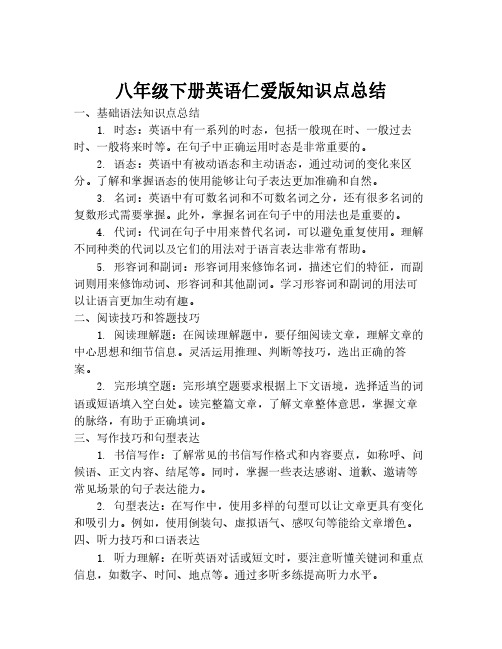
八年级下册英语仁爱版知识点总结一、基础语法知识点总结1.时态:英语中有一系列的时态,包括一般现在时、一般过去时、一般将来时等。
在句子中正确运用时态是非常重要的。
2.语态:英语中有被动语态和主动语态,通过动词的变化来区分。
了解和掌握语态的使用能够让句子表达更加准确和自然。
3.名词:英语中有可数名词和不可数名词之分,还有很多名词的复数形式需要掌握。
此外,掌握名词在句子中的用法也是重要的。
4.代词:代词在句子中用来替代名词,可以避免重复使用。
理解不同种类的代词以及它们的用法对于语言表达非常有帮助。
5.形容词和副词:形容词用来修饰名词,描述它们的特征,而副词则用来修饰动词、形容词和其他副词。
学习形容词和副词的用法可以让语言更加生动有趣。
二、阅读技巧和答题技巧1.阅读理解题:在阅读理解题中,要仔细阅读文章,理解文章的中心思想和细节信息。
灵活运用推理、判断等技巧,选出正确的答案。
2.完形填空题:完形填空题要求根据上下文语境,选择适当的词语或短语填入空白处。
读完整篇文章,了解文章整体意思,掌握文章的脉络,有助于正确填词。
三、写作技巧和句型表达1.书信写作:了解常见的书信写作格式和内容要点,如称呼、问候语、正文内容、结尾等。
同时,掌握一些表达感谢、道歉、邀请等常见场景的句子表达能力。
2.句型表达:在写作中,使用多样的句型可以让文章更具有变化和吸引力。
例如,使用倒装句、虚拟语气、感叹句等能给文章增色。
四、听力技巧和口语表达1.听力理解:在听英语对话或短文时,要注意听懂关键词和重点信息,如数字、时间、地点等。
通过多听多练提高听力水平。
2.口语表达:在平时的学习中,要勇敢开口、模仿和积极参与口语练习。
尽量多与他人交流,提高口语表达能力。
以上是八年级下册英语仁爱版的知识点总结,希望能对同学们的学习有所帮助。
学好英语需要不断的练习和积累,相信只要坚持下去,一定会取得进步的。
加油!。
初二下册英语语法知识点总结归纳仁爱版
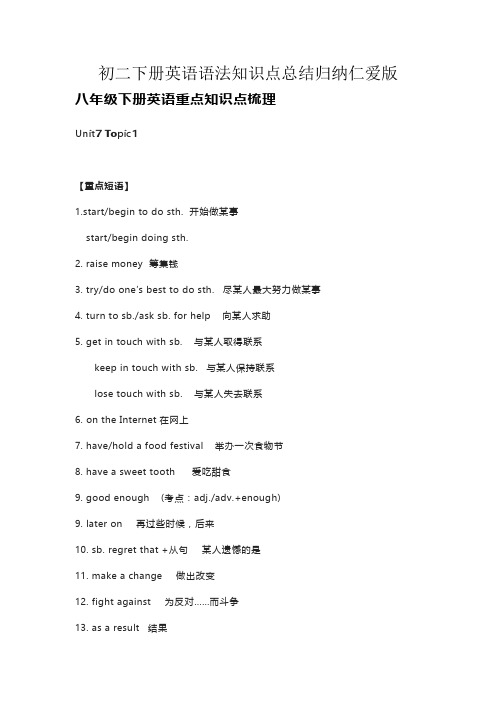
初二下册英语语法知识点总结归纳仁爱版八年级下册英语重点知识点梳理Unit7 Topic1【重点短语】1.start/begin to do sth. 开始做某事start/begin doing sth.2. raise money 筹集钱3. try/do one’s best to do sth. 尽某人最大努力做某事4. turn to sb./ask sb. for help 向某人求助5. get in touch with sb. 与某人取得联系keep in touch with sb. 与某人保持联系lose touch with sb. 与某人失去联系6. on the Internet在网上7. have/hold a food festival 举办一次食物节8. have a sweet tooth 爱吃甜食9. good enough (考点:adj./adv.+enough)9. later on 再过些时候,后来10. sb. regret that +从句某人遗憾的是11. make a change 做出改变12. fight against 为反对……而斗争13. as a result 结果14. child workers 童工15. thank you for doing sth.因为做某事而感谢某人16. make one’s dream come truerealize / achieve one's dream使某人的梦想实现【词形转换】1. success n.成功, 胜利succeed v.successful adj.2. west n.西方,西部western adj.西方的,西部的3. Greece n.希腊Greek adj.希腊的 n.希腊人4. India n.印度Indian adj.印度的,印第安人的n.印度人,印第安人5. fry v.油炸,油煎fried adj. 油炸的6. Italy n.意大利Italian adj.意大利(人)的,意大利语的n.意大利人,意大利语7. Africa n.非洲African adj.非洲的,非洲人的n.非洲人8. Russia n.俄国Russian adj.俄国(人)的,俄语的n.俄国人,俄语【重点句型】1. When and where shall we have the food festival?我们什么时候在哪儿举办食物节?2. Let’s try our best to make it a success.让我们尽我们做大的努力使它成为一件成功的事情。
仁爱英语八年级下册知识点梳理
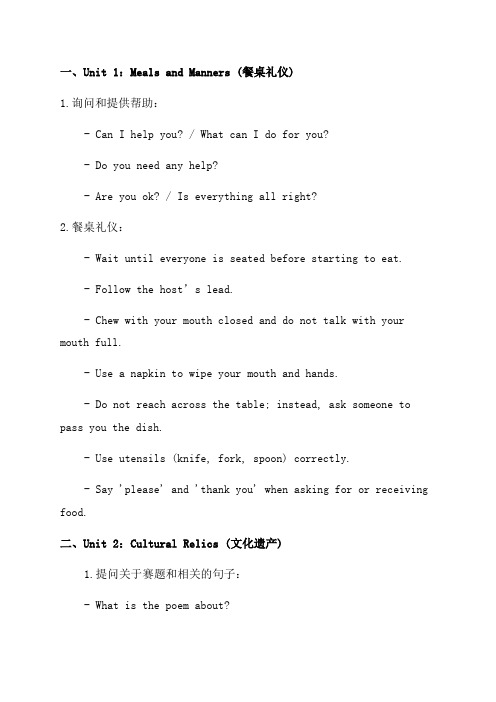
一、Unit 1:Meals and Manners (餐桌礼仪)1.询问和提供帮助:- Can I help you? / What can I do for you?- Do you need any help?- Are you ok? / Is everything all right?2.餐桌礼仪:- Wait until everyone is seated before starting to eat.- Follow the host’s lead.- Chew with your mouth closed and do not talk with your mouth full.- Use a napkin to wipe your mouth and hands.- Do not reach across the table; instead, ask someone to pass you the dish.- Use utensils (knife, fork, spoon) correctly.- Say 'please' and 'thank you' when asking for or receiving food.二、Unit 2:Cultural Relics (文化遗产)1.提问关于赛题和相关的句子:- What is the poem about?- What can you see in the picture?- What can a person learn from the painting?- What is mentioned in the text?- How does the text describe...?- What does the writer mean by...?2.介绍文化遗产:- The Great Wall of China- The Colosseum- The Parthenon- The Taj Mahal- Stonehenge- The Great Pyramid of Giza- The Sydney Opera House三、Unit 3:A taste of English humour (英式幽默之味)1.幽默和笑话:- What do you get if you cross...?- Why did the...?- What do you call...?- Why was the...?2.提出猜测:- I guess / suppose / imagine / suspect / believe- I think / feel / reckon- It seems / It appears / It looks like / It sounds like / It feels like四、Unit 4:Our world (我们的世界)1.描述地理位置:- Where is...?- It is located in...- It is in the... part of...- It is bordered by...- It is east / west / north / south of...2.描述气候和天气:- What is the weather like in...?- It is hot / cold / warm / cool / sunny / rainy / cloudy / windy / snowy.- The temperature is...- There is a chance of... / chance of rain / chance of snow.五、Unit 5:Pets and their lives (宠物与宠物的生活)1.宠物分类:- Dogs- Cats- Birds- Fish- Rabbits- Hamsters- Turtles- Snakes2.宠物的习性和需要:- Dogs need to be walked regularly.- Cats are independent animals.- Birds need a cage and regular feeding.- Fish need a tank with clean water.- Rabbits need a hutch and space to hop around.- Hamsters need a small cage with a wheel.- Turtles need a tank with water and a place to bask in the sun.- Snakes need a tank with a heat lamp and regular feeding.六、Unit 6:Green Earth (绿色地球)1.环境保护:- Reduce, Reuse, Recycle- Don't litter / Don't throw rubbish on the ground - Save water / Don't waste water- Plant trees / Save trees- Use energy-efficient light bulbs- Use public transportation / Carpool / Ride a bike - Don't use plastic bags / Use reusable bags2.环境问题:- Air pollution- Water pollution- Land pollution- Deforestation- Global warming- Climate change七、Unit 7:Serious matters (严肃的事情)1.表达不同意见:- I disagree / don’t agree with...- I think / feel / believe that...- In my opinion / view / point of view / experience...- From my experience / perspective...- It seems to me that...2.辩论技巧:- Present arguments and examples to support your opinion.- Use transition words and phrases to show contrast, cause and effect, and concession.- Listen to and consider counterarguments.- Summarize your main points and restate your opinion in the conclusion.八、Unit 8:Step by step (一步一步)1.描述过程和操作:- First, / Secondly, / Next, / Then, / Finally,- To start / begin with,- In the end / in the final step,- Use action verbs and adverbs to show the steps and sequence.2.指示和警示符号:- Danger / Warning: Signaling hazardous situations- Prohibition / No: Indicating prohibited actions- Mandatory / Must: Requiring specific actions- Information / Caution: Providing necessary information九、Unit 9:Science and technology (科学与技术)1.科技发展:- Invention and discovery- Scientific research and experimentation- Technological advancements- Medicine and health care- Pollution control and environmental protection2.比较和对比:- Similarities: Similarly, In the same way, Equally- Differences: However, On the other hand, Whereas, Unlike十、Unit 10:A famous person (一个著名人物)1.描述性格特点和外貌:- Appearance: tall, short, slim, overweight, curly / straight hair- Personality: kind, friendly, hardworking, talented, confident, determined2.描述成就和贡献:- Contributions to society / the world- Awards and honors received- Impact and influence on others以上是仁爱英语八年级下册的部分重要知识点梳理,希望对你的学习有所帮助。
仁爱英语八年级下册语言知识点
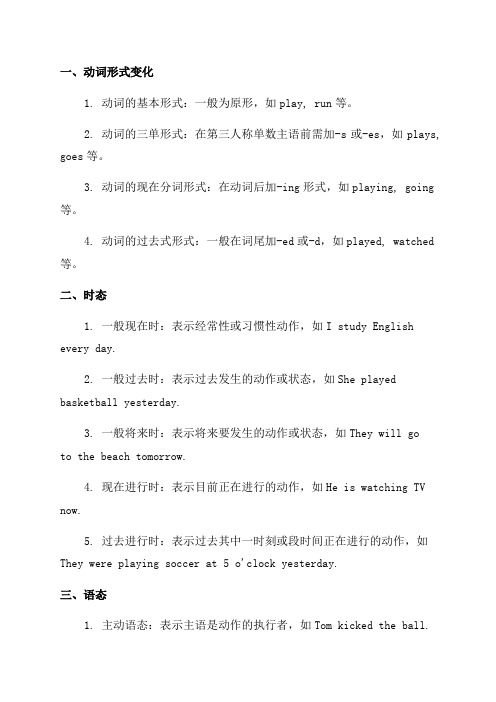
一、动词形式变化1. 动词的基本形式:一般为原形,如play, run等。
2. 动词的三单形式:在第三人称单数主语前需加-s或-es,如plays, goes等。
3. 动词的现在分词形式:在动词后加-ing形式,如playing, going 等。
4. 动词的过去式形式:一般在词尾加-ed或-d,如played, watched 等。
二、时态1. 一般现在时:表示经常性或习惯性动作,如I study English every day.2. 一般过去时:表示过去发生的动作或状态,如She played basketball yesterday.3. 一般将来时:表示将来要发生的动作或状态,如They will goto the beach tomorrow.4. 现在进行时:表示目前正在进行的动作,如He is watching TV now.5. 过去进行时:表示过去其中一时刻或段时间正在进行的动作,如They were playing soccer at 5 o'clock yesterday.三、语态1. 主动语态:表示主语是动作的执行者,如Tom kicked the ball.2. 被动语态:表示主语是动作的承受者,如The ball was kickedby Tom.四、主谓一致主谓一致表示主语和谓语动词在人称和数上保持一致。
第三人称单数主语谓语动词要加-s或-es,其他人称不加-s或-es。
五、固定搭配英语中有许多搭配词组,使用时需要牢记固定的组合形式。
六、从句从句是一个句子结构,在从句中,一般有一个主句和一个从句,与连接词that, if, whether, because等连词构成。
从句可分为名词性从句、定语从句和状语从句等。
七、虚拟语气虚拟语气用来表示与事实相反的假设、愿望、建议、要求等。
八、倒装倒装有两种情况:完全倒装和部分倒装。
完全倒装是动词位于主语之前;部分倒装是助动词,情态动词,或系动词位于主语之前。
- 1、下载文档前请自行甄别文档内容的完整性,平台不提供额外的编辑、内容补充、找答案等附加服务。
- 2、"仅部分预览"的文档,不可在线预览部分如存在完整性等问题,可反馈申请退款(可完整预览的文档不适用该条件!)。
- 3、如文档侵犯您的权益,请联系客服反馈,我们会尽快为您处理(人工客服工作时间:9:00-18:30)。
Unit5Feeling ExcitedTopic1:I’m so happy.1.How are you doing?=How are you?你好吗?2.invite sb.to do sth=ask sb.to do邀请某人做某事3.prep are for sth准备某事(准备时间较长/思想上的准备):pr epare for the examsth for sb.为某人准备…:prepare food for Lilyto do sh准备做…:I prepare to go hiking.4.say sth to sb.对某人说….:say thanks/hello/goodbye to Jane5.系动词+adj.系表结构①be(am/is/are/was/were)②感官v.(feel,look,sound,taste品尝,smell闻、嗅)③四变化(turn/become/go/get)*turn侧指颜色变化④keep,stay,mak e6.O ne of+the+形容词最高级+可数名词复数“……中最……之一”。
当其做主语,谓语动词用单数。
e.g.On e of the bags is mine. e.g.It is one of the most interesting books.7.a ticket to/for…一张…的票a ticket to/for the concert一张音乐会的门票8.be+adj.+介词结构be proud of自豪,骄傲 e.g.The teacher is proud of his student.人+be pleased with+物对……感到满意 e.g.Jim is pleased with his new bike.物+be popular with+人受…的欢迎e.g.The b ook is popular with students.be worried about;be afraid of;be angry with;be interested in;be nervous about;be famous for+sth/as+身份be surprised at;be excited about/at sth;be strict with sb.9.set the table for sb.为某人摆餐具 e.g.I’m setting the table for guests.10.I hope everything goes well.我希望一切顺利。
【go well进展顺利】11.be able to do能够做……指通过努力能够实现的(*will be able to)can能指人所具有的一种能力12.ring up sb.=call sb.=phone sb.=give sb.a call打电话13.be sorry for sb.对某人感到抱歉 e.g.I am sorry for you.be sorry about sth对某事感到难过 e.g.I am sorry about your illness.be sorry that+从句 e.g.I’m sorry that he lost the game.14.lonely—adj.“孤单的、寂寞的”强调精神上的孤单、寂寞,但未必一个人alone—adv.“单独地”强调一个人独处,但精神上未必寂寞。
e.g.The old man lives alone,but he doesn’t feel lonely.15.because of+名词./短语:I can’t go to the party because of the weather.because+句子:I can’t go to the party because it rains heavily.16.on the/one’s way to+地点“在去…的路上”e.g.on the way to s chool on one’s/the way home在回家的路上注意:home,here,there是副词,前面不需要介词。
17.容器+be full o f+物=be filled with装满,充满e.g.The cup is full of/filled with water.18.mak e peace with sb.与某人和解Topic2:I’m feeling better now.1.+从句:It seems/ed that he is/was ill.seem的用法+to do:He seems/ed to be ill.+形容词.:He seems/ed ill.2.do badly/well in=be bad/good at在某方面做得好/不好3.She has no friends to talk with.她没有可以交谈的朋友。
【动词不定式在此处做:后置定语】4.have a talk with sb.=talk to/with sb.与某人交谈5.be worried about sth对……感到担心=worry about sth担心……6.send sth to sb.=send sb.sth把某物寄给某人7.T ake it easy.别着急!/别紧张!8.I want to be your friend.我想成为你的朋友。
=I want to make friends with you.我想和你交朋友。
mak e friends with sb.和某人交朋友9.fail/pass the exam考试不及格/通过考试10.Everyone gets these feelings at your age.at one’s age在某人的这段年龄时区别:at the age of在…岁时in one’s teens在某人十几岁时11.call sb.at+号码打…号码找某人 e.g.call Mr.W an gat228790412.too much+不可数n.太多的……m uch too+adj.实在太……13.get/be u se d to doing sth习惯于做某事区:used to do过去常常做…e.g.I am/get u se d to getting up early.我习惯于早起。
14.as+adj./adv.原级+as……和……一样e.g.-Helen is as tall as Maria. e.g.-Helen runs as quickly as Lily.not+as/so+adj./adv.原级+as……不如……e.g.-Helen isn’t as tall as Maria. e.g.-Helen doesn’t sing as/so well as Lucy.注:①无论是肯定结构as…as…还是否定结构not as/so…as..,中间都用adj/adv原级。
②谓语若是be,则用adj.原级;谓语若是v.,则用adv.原级。
15.speak in public在公共场所说话16.fall asleep入睡mak e faces做鬼脸17.be killed in在…中丧身 e.g.He was killed in the accident.18.refuse to do拒绝做某事even though=even if尽管,即使no longer=not…any longer(多用于延续性v.)19.不再You won’t live in Fuzhou a ny longer.=Y ou will no longer live in Fuzhouno more=not…any more(多用于短暂性v.)e.g.You won’t see him any more.=You will see him no more.T opic3:Many things can affect our feelings.1.must be----肯定推测;can’t be---否定推测may b e---可能性较小的推测e.g.The boy must be Jim.This book can’t be Jim’s.2.hate to do=hate doing讨厌做某事3.follow one’s advice遵从某人的建议get well=become well康复4.I hope so.-----I hope not.I’m afraid so.----I’m afr aid not.I believe so.----I believe not.I think so.-----I don’t think so.5.tak e turns to do轮流做某事:W e tak e turns to sing songs.in turn轮流:W e sing song s in turn.It’s one’s turn to do轮到某人做某事:It’s my turn to clean a room.6.study/learn(sth)by oneself=teach oneself(sth)自学(某事)7.That’s very nice of you.你真好!(of表人的性格、品质)8.It’s+adj.+for sb.+to do sth.It’s important for me to study well.It’s+adj.+of sb.+to do sth It’s nice of you to help me.注:若adj.用来修饰人的性格、品质,则用of,若adj.用来修饰to do,则用for。
9.help sb.with sth.=help sb.(to)do sth帮助某人做某事e.g.I help Jim with English.=I help Jim to study English.10.affect one’s feelings影响某人的心情11.心情好:be in a good mood/be in good spirits/feel one’s best心情不好:be in a bad mood/be in low spirits情绪高涨:be in high spirits12.give a surprise to sb.给某人一个惊喜in surprise惊奇地to one’s surprise令某人惊喜的是13.at the English corner在英语角14.let sb.(not)do让某人(别)做某事mak e sb.(not)do15.get al ong/on(well)with sb.与某人相处(融洽)16.give a speech演讲.get togethe r with sb.与某人团聚17.too+形容词/副词+to…=so+形容词/副词+句子“太……而无法……”e.g.It’s too noisy for me to fall asleep.=It’s so noisythat I can’t fall asleep.18.be important to sb.对某人来说是重要的be important for sb.to do sth对某人来说做某事是重要的19.remember to do记得去做某事(事情还没做)remember doing记得曾做过某事(事情已做了)20.mak e a decision(to do)=decide(to do)决定做某事Unit6Enjoy CyclingT opic1I have some exciting news to tell you.一、重点词组1.go on a visit to去……旅行2.mak e the decision做决定3.bring back带回4.go on a field trip去野外旅行5.decide on(upon)sth对某事做出决定6see the sunrise看日出7.mak e a reservation预订e up with想出(主意)9.look forward to(doing)sth期望10.pay for支付;赔偿11.raise money筹钱12.book a ticket订票13.mak e a room for sb为……订房间14.have a wonderful time玩得愉快15.in the daytime在白天16.a two-day visit为期两天的旅行17.find out查出18.some places of interest名胜19.r ooms with bathtub带浴室的房间20.a hard(soft)sleeper硬(软)卧二.重点句型及重点语言点1.I have some exciting news to tell you.我有一些激动人心的消息要告诉你们。
